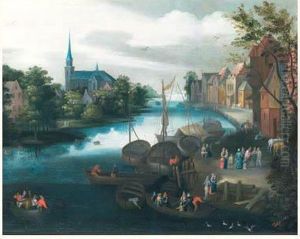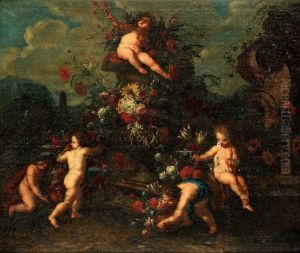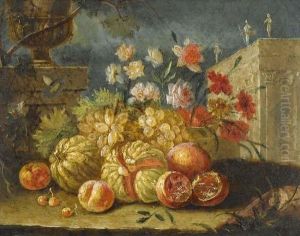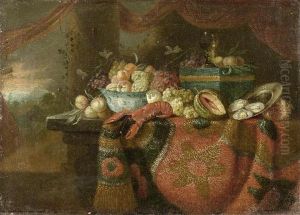Jan Baptist Brueghel Paintings
Jan Baptist Brueghel, also known as Jan Brueghel the Younger, was a Flemish Baroque painter born in Antwerp in 1601. He was part of the famous Brueghel family, a dynasty of artists that spanned several generations. Jan Baptist was the son of Jan Brueghel the Elder, a prominent landscape and still-life painter, and the grandson of Pieter Brueghel the Elder, who was renowned for his complex scenes of peasant life. Though less famous than his father and grandfather, Jan Baptist made his own mark in the world of art, focusing primarily on continuing the family tradition of landscape and still-life painting.
Jan Baptist received his initial training from his father, which was common practice in artist families at the time. After his father's death in 1625, he took over the family workshop. Brueghel's works often reflect a strong influence from his father's style, particularly in his use of color and composition. He was known for his detailed landscapes that often included mythological or biblical themes. His paintings also frequently featured flowers, a subject his family was renowned for depicting with great skill.
In 1625, Jan Baptist became a master in the Guild of St. Luke, an association for painters and other artists. His career saw him also becoming involved in the administration of the guild, holding various positions. Brueghel's works were sought after by collectors and patrons throughout Europe, including in the courts of France and the Southern Netherlands. Despite the shadow of his more famous relatives, Jan Baptist was successful in his own right and contributed to the enduring legacy of the Brueghel family name in art history.
Jan Baptist Brueghel's death occurred in Antwerp in 1678. His legacy continued through his children, several of whom also became painters, thus extending the Brueghel artistic lineage. While his works might not be as well-known as those of his father or grandfather, they nonetheless exhibit the family's characteristic attention to detail and a deep appreciation for the natural world.



